#Rev. Isaac Munther
Text
Christmas Cancelled in Bethlehem
Last week, Christian church leaders in the city of Bethlehem announced the cancellation of traditional Christmas festivities in the place traditionally associated with the Jesus’ birth.
And this for at least two obvious reasons. For one, the genocidal killings by colonial settlers in Palestine’s occupied West Bank have made it impossible for tourists to come to Bethlehem.
For another,…
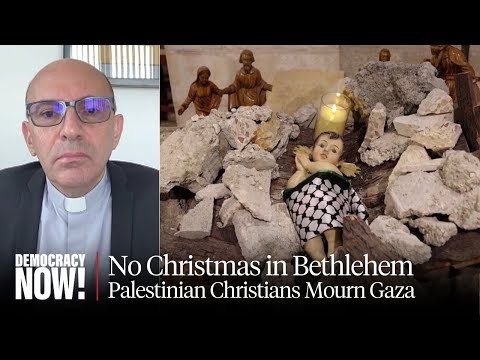
View On WordPress
#"Democracy Now"#Amy Goodman#Bethlehem#Christmas#Dar al-Kalima University#Gaza#Genocide#Genocide Joe Biden#Liberation theology#Rev. Isaac Munther#Rev. Mitri Raheb#Sabeel Liberation Theology Centre
2 notes
·
View notes
Text

“God is under the rubble in Gaza. He is with the frightened and the refugees. He is in the operating room. This is our consolation. He walks with us through the valley of the shadow of death.”
– Rev. Dr. Munther Isaac, in his sermon “God is under the rubble in Gaza.”
I made this painting of the manger scene created by Rev. Dr. Isaac’s church, Christmas Lutheran Church in Bethlehem, with the Christ child under the rubble (original image here).
Full sermon • An interview with Rev. Dr. Isaac about the installation
9K notes
·
View notes
Text

2023 Nativity Scene at the Evangelical Lutheran Christmas Church, Bethlehem, Palestine
"In Gaza today, God is under the rubble. He is in the operating room. If Christ were to be born today, he would be born under the rubble. We see his image in every child killed and pulled from under the rubble. In every child in incubators," writes Rev. Munther Isaac of the church.
13K notes
·
View notes
Text
This post used to hold a poem inspired by the Rev. Munther Isaac's declaration that "God is under the rubble in Gaza."
After a few anons and a conversation with a Jewish friend, I've decided to take the poem down because, regardless of my own intentions with it, it risks feeding the long and extremely harmful history of blood libel, because I included imagery of the infant Jesus and his parents being killed by an Israeli soldier, as many Palestinians are being killed now.
Before talking with that friend, I wrote in this response to an anon about my intentions with the poem — but while I do believe that intentions do matter, they don't matter nearly as much as impact does.
My friend helped me come to the conclusion that while the poem I wrote could be interpreted as I intended by people who already have all the context I wrote it in (see below), it could also all too easily be interpreted much more harmfully by those who lack that context — or worse, who are looking for more fuel for their antisemitism. The poem is not worth that risk, not at all.
___
Ultimately, I hold two things I believe to be true in tension:
that Christians throughout the ages have found deep comfort and encouragement in understanding Jesus as suffering in and with them. I support all Christian Palestinians who, like Rev. Isaac, experience God-with-them in this way — in this horrific time, they deserve any ounce of comfort they can derive. And them personally seeking and finding the Divine presence with them is not antisemitic.
that for Christians like myself in the USA, who live in the beating heart of Empire and Christian Supremacy, it is vital to take care in how we talk about this theology in this current situation, where the oppressors are Jewish. Providing more fuel for Christian antisemitism is inexcusable, and I deeply apologize for writing and sharing a piece that can be used in that way.
Because modern-day Israel is a Jewish state, exploring that Divine solidarity in this context comes with a great risk of perpetuating the long, harmful history of antisemitic blood libel and accusations of deicide. How do we affirm God’s presence with those suffering in Palestine without (implicitly or explicitly) adding to the poisonous lie that “the Jews killed Jesus”?
In wrestling with this complexity, I tried to write this poem to uplift both Jesus’s Jewishness and his solidarity with Palestinians. Jesus was born into a Jewish family, his entire worldview was shaped by his Jewishness, and he shared in his people’s suffering under the Roman Empire. His solidarity with Palestinians of various faiths suffering today does not erase that Jewishness. Nor does it mean that Jewish persons don’t “belong” in the region — only that modern Israel’s occupation of Palestine is in no way necessary for Jews to live and thrive there, or anywhere else in the world.
I also aimed to point out that Israel is by no means acting alone in this attack on Gaza or their decades-long occupation of Palestine. There is a much larger Empire at work, with my own country, the United States, at the helm. Israel is entangled in that imperial mess, and directly backed and funded by those forces — not because of what politicians claim, that we have to back Israel or else we’re antisemitic, but because Israel is our strategic foothold in the so-called Middle East. How do we name our complicity as our tax dollars are funneled into violence across the world, and act to end that violence?
___
I'm sorry this post isn't as articulate as I want it to be. All of this to say: I deeply apologize for any hurt my poem caused. I understand how horrific Christianity's history of — and ongoing present — antisemitism is, and how it poisons and warps so much that could have been beautiful. I'll keep educating myself; I'll keep having hard conversations; I'll keep working to uproot antisemitism in myself and my communities.
___
I'll close with a list of resources for learning about Palestine's history and getting involved.
#deeply grateful E that you were willing to have that conversation with me!#you didn't have to and i appreciate the time and energy you spent doing so. solidarity forever <3
1K notes
·
View notes
Text
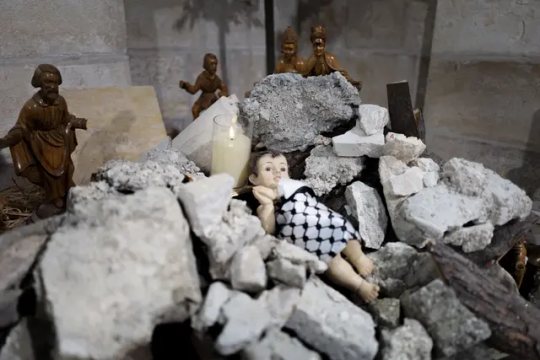

A short walk from the Church of the Nativity is the Evangelical Lutheran Christmas Church. There, the Rev. Munther Isaac and his congregation chose this year to make a statement about the killing of so many children in Gaza.
Using broken cement and paving stones, they placed the baby Jesus in the center of a pile of debris from a collapsed home, inspired by television images of children being pulled from the rubble, Issac says.
"I always say we need to de-romanticize Christmas," he says. "In reality, it's a story of a baby who was born in the most difficult circumstances and the Roman Empire under occupation, who survived the massacre of children himself when he was born. So the connection was natural to us."
There's no Christmas in Bethlehem this year. With war in Gaza, festivities are off
903 notes
·
View notes
Text
"Many Palestinian Christians are unable to celebrate Easter this year, as Israel’s bombardment of Gaza continues.
"Gaza’s Christian community of less than 1,000 people is facing threats of extinction. Palestinian Christian pastor Rev. Dr. Munther Isaac shares his message for the world about the plight of Palestinians this Easter." from AJ Plus, 31/Mar/2024:
#easter#happy easter#christianity#palestinian christians#palestine#free palestine#gaza#free gaza#from the river to the sea palestine will be free#i stand with palestine#rafah#save rafah#human rights#social justice#this is genocide
537 notes
·
View notes
Text
Jesus is Under the Rubble
“This Advent, while global Christians prepare to commemorate the arrival of the Prince of Peace, our Palestinian kin in Gaza suffer unthinkable violence. Their cries of deliverance, echoing those of two millennia ago, seem to be falling unheard on the United States.”
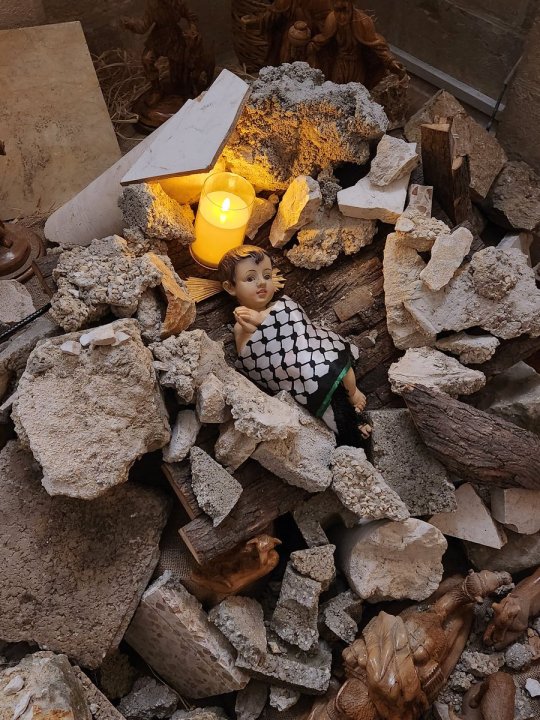
youtube
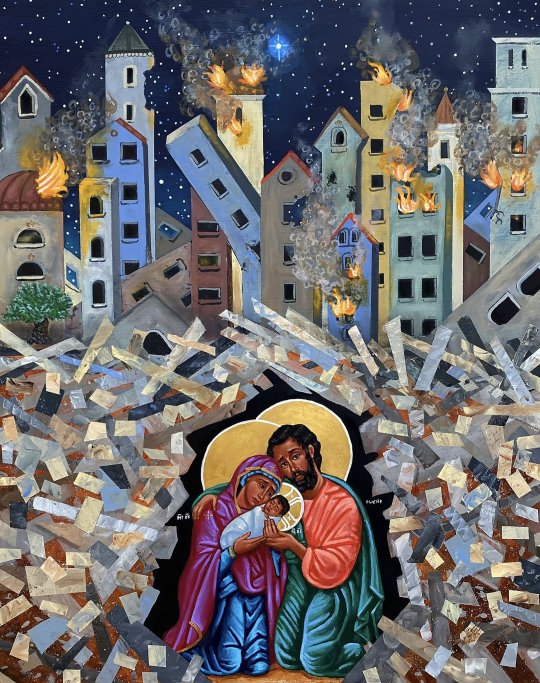
— by Kelly Latimore icons. All proceeds from sales of this digital image will go toward Red Letter Christians trusted partners in Gaza.
Transcript:
Christ in the Rubble
A Liturgy of Lament
Rev. Dr. Munther Isaac
Evangelical Lutheran Christmas Church Bethlehem
Saturday, December 23rd, 2023
We are angry…
We are broken…
This should have been a time of joy; instead, we are mourning. We are fearful.
Twenty thousand killed. Thousands under the rubble still. Close to 9,000 children killed in the most brutal ways. Day after day after day. 1.9 million displaced! Hundreds of thousands of homes were destroyed. Gaza as we know it no longer exists. This is an annihilation. A genocide.
The world is watching; Churches are watching. Gazans are sending live images of their own execution. Maybe the world cares? But it goes on.
We are asking, could this be our fate in Bethlehem? In Ramallah? In Jenin? Is this our destiny too?
We are tormented by the silence of the world. Leaders of the so-called “free” lined up one after the other to give the green light for this genocide against a captive population. They gave the cover. Not only did they make sure to pay the bill in advance, they veiled the truth and context, providing political cover. And, yet another layer has been added: the theological cover with the Western Church stepping into the spotlight.
The South African Church taught us the concept of “The state theology,” defined as “the theological justification of the status quo with its racism, capitalism and totalitarianism.” It does so by misusing theological concepts and biblical texts for its own political purposes.
Here in Palestine, the Bible is weaponized against our very own sacred text. In our terminology in Palestine, we speak of the Empire. Here we confront the theology of the Empire. A disguise for superiority, supremacy, “chosenness,” and entitlement. It is sometimes given a nice cover using words like mission and evangelism, fulfillment of prophecy, and spreading freedom and liberty. The theology of the Empire becomes a powerful tool to mask oppression under the cloak of divine sanction. It divides people into “us” and “them.” It dehumanizes and demonizes. It speaks of land without people even when they know the land has people – and not just any people. It calls for emptying Gaza, just like it called the ethnic cleansing in 1948 “a divine miracle.” It calls for us Palestinians to go to Egypt, maybe Jordan, or why not just the sea?
“Lord, do you want us to command fire to come down from heaven and consume them?” they said of us. This is the theology of Empire.
This war has confirmed to us that the world does not see us as equal. Maybe it is the color of our skin. Maybe it is because we are on the wrong side of the political equation. Even our kinship in Christ did not shield us. As they said, if it takes killing 100 Palestinians to get a single “Hamas militant” then so be it! We are not humans in their eyes. (But in God’s eyes… no one can tell us we are not!)
The hypocrisy and racism of the Western world is transparent and appalling! They always take the words of Palestinians with suspicion and qualification. No, we are not treated equally. Yet, the other side, despite a clear track record of misinformation, is almost always deemed infallible!
To our European friends. I never ever want to hear you lecture us on human rights or international law again. We are not white— it does not apply to us according to your own logic.
In this war, the many Christians in the Western world made sure the Empire has the theology needed. It is self-defense, we were told! (And I ask: how?)
In the shadow of the Empire, they turned the colonizer into the victim, and the colonized into the aggressor. Have we forgotten that the state was built on the ruins of the towns and villages of those very same Gazans?
We are outraged by the complicity of the church. Let it be clear: Silence is complicity, and empty calls for peace without a ceasefire and end to occupation, and the shallow words of empathy without direct action— are all under the banner of complicity. So here is my message: Gaza today has become the moral compass of the world. Gaza was hell on earth before October 7th.
If you are not appalled by what is happening; if you are not shaken to your core— there is something wrong with your humanity. If we, as Christians, are not outraged by this genocide, by the weaponizing of the Bible to justify it, there is something wrong with our Christian witness, and compromising the credibility of the Gospel!
If you fail to call this a genocide. It is on you. It is a sin and a darkness you willingly embrace.
Some have not even called for a ceasefire.
I feel sorry for you. We will be okay. Despite the immense blow we have endured, we will recover. We will rise and stand up again from the midst of destruction, as we have always done as Palestinians, although this is by far the biggest blow we have received in a long time.
But again, for those who are complicit, I feel sorry for you. Will you ever recover from this?
Your charity, your words of shock AFTER the genocide, won’t make a difference. Words of regret will not suffice for you. We will not accept your apology after the genocide. What has been done, has been done. I want you to look at the mirror… and ask: where was I?
To our friends who are here with us: You have left your families and churches to be with us. You embody the term accompaniment— a costly solidarity. “We were in prison and you visited us.” What a stark difference from the silence and complicity of others. Your presence here is the meaning of solidarity. Your visit has already left an impression that will never be taken from us. Through you, God has spoken to us that “we are not forsaken.” As Father Rami of the Catholic Church said this morning, you have come to Bethlehem, and like the Magi, you brought gifts with, but gifts that are more precious than gold, frankincense, and myrrh. You brought the gift of love and solidarity.
We needed this. For this season, maybe more than anything, we were troubled by the silence of God. In these last two months, the Psalms of lament have become a precious companion. We cried out: My God, My God, why have you forsaken Gaza? Why do you hide your face from Gaza?
In our pain, anguish, and lament, we have searched for God, and found him under the rubble in Gaza. Jesus became the victim of the very same violence of the Empire. He was tortured. Crucified. He bled out as others watched. He was killed and cried out in pain— My God, where are you?
In Gaza today, God is under the rubble.
And in this Christmas season, as we search for Jesus, he is to be found not on the side of Rome, but our side of the wall. In a cave, with a simple family. Vulnerable. Barely, and miraculously surviving a massacre. Among a refugee family. This is where Jesus is found.
If Jesus were to be born today, he would be born under the rubble in Gaza. When we glorify pride and richness, Jesus is under the rubble.
When we rely on power, might, and weapons, Jesus is under the rubble.
When we justify, rationalize, and theologize the bombing of children, Jesus is under the rubble.
Jesus is under the rubble. This is his manger. He is at home with the marginalized, the suffering, the oppressed, and displaced. This is his manger.
I have been looking, contemplating on this iconic image….God with us, precisely in this way. THIS is the incarnation. Messy. Bloody. Poverty.
This child is our hope and inspiration. We look and see him in every child killed and pulled from under the rubble. While the world continues to reject the children of Gaza, Jesus says: “just as you did it to one of the least of these brothers and sisters of mine, you did it to me.” “You did to ME.” Jesus not only calls them his own, he is them!
We look at the holy family and see them in every family displaced and wandering, now homeless in despair. While the world discusses the fate of the people of Gaza as if they are unwanted boxes in a garage, God in the Christmas narrative shares in their fate; He walks with them and calls them his own.
This manger is about resilience— صمود. The resilience of Jesus is in his meekness; weakness, and vulnerability. The majesty of the incarnation lies in its solidarity with the marginalized. Resilience because this very same child, rose up from the midst of pain, destruction, darkness and death to challenge empires; to speak truth to power and deliver an everlasting victory over death and darkness.
This is Christmas today in Palestine and this is the Christmas message. It is not about Santa, trees, gifts, lights… etc. My goodness how we twisted the meaning of Christmas. How we have commercialized Christmas. I was in the USA last month, the first Monday after Thanksgiving, and I was amazed by the amount of Christmas decorations and lights, all the and commercial goods. I couldn’t help but think: They send us bombs, while celebrating Christmas in their land. They sing about the prince of peace in their land, while playing the drum of war in our land.
Christmas in Bethlehem, the birthplace of Jesus, is this manger. This is our message to the world today. It is a Gospel message, a true and authentic Christmas message, about the God who did not stay silent, but said his word, and his Word is Jesus. Born among the occupied and marginalized. He is in solidarity with us in our pain and brokenness.
This manger is our message to the world today – and it is simply this: this genocide must stop NOW. Let us repeat to the world: STOP this Genocide NOW.
This is our call. This is our plea. This is our prayer. Hear oh God. Amen.
(Source)
I found these on Twitter a while ago. Original creator unknown.
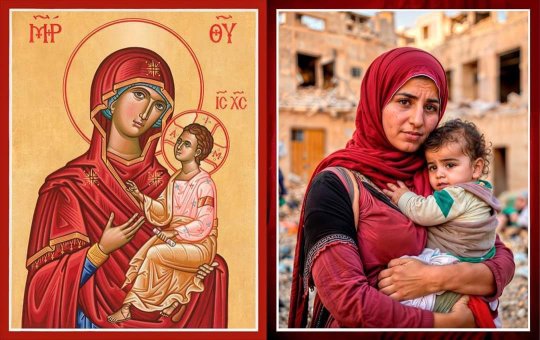
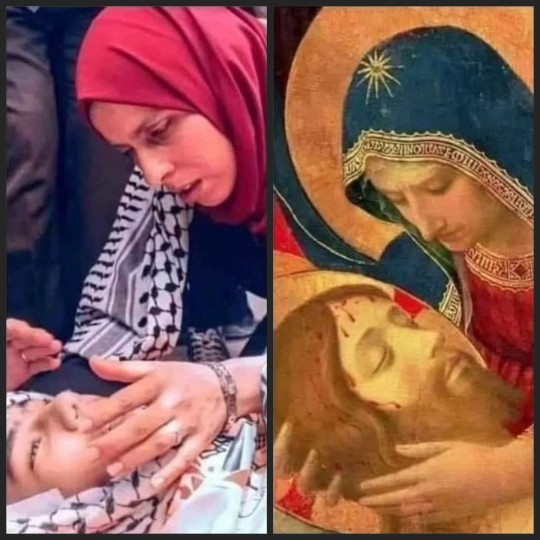
I can't stop you ascribing hateful, paranoid meanings to these images, but they're not about blaming religions. Jesus was a Jew born to a community of Jews in Palestine, the cradle of the Abrahamic faiths. He was raised and loved by them, betrayed by their rulers* and killed by Romans. He's a Prophet of Islam. End of.
*Y'know, like how the people of the Arab and Muslim nations love Palestine and crying to help them, except their leaders are greedy and rotted to the core. The ruling class will always only serve the empire.
Edit: alt text provided by @this-world-of-beautiful-monsters
#tag has stopped trending so please boost#catholicism#christmas#christianity#orthodox christianity#jerusalem#bethlehem#free gaza#save gaza#free palestine#christ child#racism#western imperialism#evangelical christianity#lutheran#us imperialism#fuck israel#israeli war crimes#israel is a terrorist state#white supremacy#colonization#manifest destiny#theology#anti zionism#christian zionism#human rights#war propaganda#i/p#knee of huss
308 notes
·
View notes
Text
youtube
Bethlehem Pastor Rev. Munther Isaac:
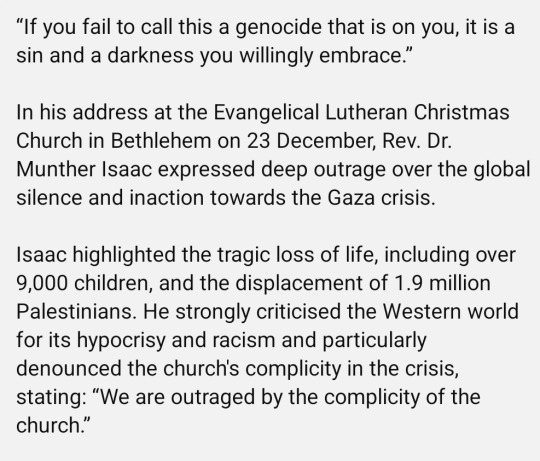
.
#the economic times#jesus christ were born today he'd be born in Gaza's rubble#israel's genocide#netanyahu a criminal of war#free palestine#Youtube
354 notes
·
View notes
Text
As Ramadan begins, and I see Muslims reflect on this year's fast in particular, I remember my similar thoughts as Lent began. What does fasting mean when you are forced into it? What does it mean to enter a holy season while drones buzz incessantly? What is reflection, charity, sacrifice when your whole family has been murdered? How do you give your children the gift of faith when they're traumatized or starving or gone? How can you look to the feast at the end of the season with hope when there is no sign of change?
I think of the pictures the Lutheran church in Bethlehem shared on Ash Wedesday, of Rev. Munther Isaac smearing ashes on children's foreheads. What does it mean to remind a Palestinian child that they will die? To look them in the eye and say they will return to dust and think, But please, God, not today. Not today.
Seasons and holidays have been a blessing to me in my darkest moments, but nothing I've experienced can come close to comparing. I can hope the faithful are finding God in this time, but when does that become a selfish hope? What a horrible expectation to have of them, while my country funds their bombing. Who am I to hope there is holiness in that? when I decided not to fast for mental health reasons?
I see a video of children celebrating the beginning of Ramadan. I don't have a right to wish them joy but I marvel at their faith that is more than I have ever had. More than they should have to have. I pass by dates in the grocery store and don't buy any. I wish those children could come to my door this evening. I would buy all the dates in the store. I donate to a Gofundme instead that I hope can get to someone who needs it.
A friend asks what she should do for Passover if this is still what the world looks like and I say, knowing it's not really for me to answer (none of this is), you do what you've told me you do every year. You pray for God to pass over those surrounded by violence. You ask for freedom for those who need it. You sing the songs of people who had to survive so much, many of whom didn't make it to the next year's holy days. The holidays come when there is war, like they have for centuries. There is always violence. We keep the faith anyway.
Lord of many peoples and names, I repent most of all this Lent of my country's crimes. I ask for many miracles, knowing that I am called to work to bring them into existence. I ask for those children to make it to next Ash Wednesday. And the one after. I ask for dates for every child to break their fast. I ask for a silent sky.
Rabadan Mubarak, from the bottom of my heart, knowing that I cannot bless this season, but praying God will.
83 notes
·
View notes
Text
I do recommend watching the whole thing but here is a clip from Rev. Munther Isaac's Christmas sermon entitled 'Jesus under the rubble', delivered in Bethlehem in the occupied West Bank on Saturday.
Transcript under the cut:
This war has confirmed to us that the world does not see us as equal. Maybe it's the colour of our skins. Maybe it is because we are on the wrong side of a political equation. Even our kinship in Christ did not shield us.
So they say, "if it takes killing 100 Palestinians to get a single Hamas militant then so be it". We are not humans in their eyes. But in God's eyes, no one can tell us that.
The hypocrisy and racism of the Western World is transparent and appalling. They always take the word of Palestinians with suspicion and qualification. No, we not treated equally. Yet on the other side, despite a clear track record of misinformation, lies, their words are almost always deemed infallible.
To our European friends: I never, ever want to hear you lecture us on human rights or international law again. And I mean this. We are not White. I guess it does not apply to us according to your own logic.
So here is my message: Gaza today has become the moral compass of the world. Gaza was held before October 7th and the world was silent. Should we be surprised that they're silent now? If you are not appalled by what is happening in Gaza, if you are not shaken to your core, there is something wrong with your humanity. And if we as Christians are not outraged by the genocide, by the weaponization of the Bible to justify it, there is something wrong with our Christian witness and we are compromising the credibility of our Gospel message.
If you fail to call this a genocide then that is on you. It is a sin and a darkness you willingly embrace. Some have not even called for a ceasefire - I'm talking about churches. I feel sorry for you.
We will be okay. Despite the immense blow we have endured, we the Palestinians will recover. We will rise. We will stand up again from the midst of destruction as we have always done as Palestinians - although this is by far maybe the biggest blow we have received in a long time. But we will be okay.
But for those who are complicit, I feel sorry for you. Will you ever recover from this? Your charity and your words of shock after the genocide won't make a difference. And I know these words of shock are coming, and I know people will give generously for charity. But your words won't make a difference. Words of regret won't suffice for you.
And let me say it: we will not accept your apology after the genocide. What has been done has been done. I want you to look at the mirror and ask: where was I when Gaza was going through a genocide?
112 notes
·
View notes
Text
For those celebrating Easter today, I really recommend reading this sermon by Rev. Munther Isaac. It was preached in Beit Sahour and Bethlehem on October 22nd, following the bombing of St. Porphyrius Greek Orthodox Church. In less than a week, it will mark six months of this genocide.
What is happening in Gaza is not a war or a conflict, but an annihilation — continuous genocide and ethnic cleansing through death and forced displacement. World political powers are sacrificing the people of Palestine in order to secure their interests in the Middle East; they say our annihilation is needed to keep the people of Israel safe. They offer us as sacrifices on the altar of atonement, as we pay the price for their sins with our lives.
Where is the justice? They talk about international law. They lecture us on human rights and look down upon us as if they are superior to everyone else in terms of values and morals. I say to them, “Go away with your laws and your talk about human rights.” You Europeans and Americans have been stripped naked in front of the whole world today. Your racism and hypocrisy have been exposed. Truly, is there no shame? I personally do not want to hear about peace and reconciliation.
The people of Gaza today want life. They want a night without bombing. They want medicine and surgical operations with anesthesia. They want the simplest of life’s necessities: food, clean water, and electricity. They want freedom and life with dignity. Those under bombardment, beatings, and persecution do not want to hear about reconciliation and peace. They want the end of aggression!
They asked us to pray. The people of Gaza are still asking us to pray, and they are still praying. Where do you get this faith?
We prayed. We prayed for their protection … and God did not answer us, not even in the “house of God” were church buildings able to protect them. Our children die before the silence of the world, and before the silence of God. How difficult is God’s silence!
42 notes
·
View notes
Text

“And she brought forth her firstborn son, and wrapped him in swaddling clothes, and laid him in a manger; because there was no room for them in the inn.” (Luke 2:7)
No room. That’s something I’ve heard too much lately. Palestinians have been hearing that for 75 years. Since they were driven out of their homes—more than 700 000 of them—in 1948 to make room for the colony of Israel, there has been less and less room every day. Less land, literally, as even though lines and walls have been drawn over the years, Israel continues to illegally settle in Palestinian land. Less room to breathe, as the population of Gaza grew within the illegal blockade walling them into a tiny strip of land. Less room to live now, as Gaza has been under constant attack by Israeli bombs and guns and while the civilians of Gaza are pushed by this violence into even smaller and smaller “safe zones” (though there is nowhere safe in Gaza right now).
But also no room our conversations. No room in our imagination. No room in our understanding of our world of “human rights” and “developed nations.” You’d think “Palestinian” is a slur for how quickly it shuts up (or heats up) dialogue. These are our neighbours, and it feels like pulling teeth to get people to engage with their humanity—let alone ask their MP to ask our government to ask Israel’s government to please stop bombing civilians for the third month straight.
Today we recognize when a Jewish Palestinian family was forced by the state to leave their home, shelter in unfit terrain, give birth without proper medical care, survive a massacre, and become refugees. We Christians call the baby born in that family Emmanuel, which means God with us. God was born in Bethlehem, behind the border wall, in an occupation. What does that tell us about who God is?
Our Christian siblings in Palestine have asked us not to let this Christmas pass as usual. To that, I ask, what is Christmas as usual? If we don’t see our neighbours in the story of Jesus, what is the point? If we need to put the real, genuine injustices of the world out of our mind so that we can be comforted by Christmas, we are frankly doing it wrong. The point—the whole point—is that love and justice are possible for the unloved and the oppressed, even when it doesn’t feel that way. It is our responsibility to make that happen, and we can’t do that with our eyes closed.
You should feel uncomfortable about celebrating Christmas while a genocide is going on. We need to have room for that. We also need to have room for the hope that Christmas represents. We need to have room in our hearts for justice, lasting peace, and a free Palestine, because we are all needed to make it a reality.
And for God’s sake, CEASEFIRE NOW!
“He has brought down the mighty from their thrones/ and exalted those of humble estate;/ he has filled the hungry with good things,/ and the rich he has sent away empty.” (Luke 1:52-53)
.
.
.
I am indebted to Rev. Munther Isaac for his wisdom in helping so many of us walk through this time. Personally, I just finished his book “The Other Side of the Wall”—if you are a Christian, you have to read this book. I’ll buy you a copy if you want.
I also want to note that this post isn’t really supposed to be an explainer or an argument. I didn’t cite anything here, but if you’re curious about anything I referenced (e.g. why did I bring up medical care?), send me a message and I’d be happy to give you more details about what’s happening in Palestine. I’m no expert, but I know some people just genuinely don’t know the extent of the injustice and don’t know where to learn more; if you have questions I’m happy to help, but I’m not here to fight with you.
Same deal if you want to help but don’t know how. I’m happy to give you some ideas and even help you out with them (distance permitting). One important action you can always take is contacting your Member of Parliament. You don’t have to write anything fancy—just tell them honestly how you’re feeling and ask them to support an urgent ceasefire. This is literally your right as a Canadian, so you don’t have to worry about doing something wrong.
56 notes
·
View notes
Text
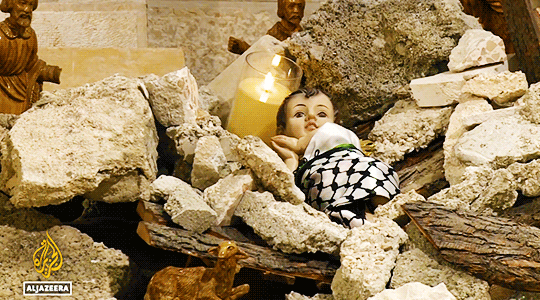
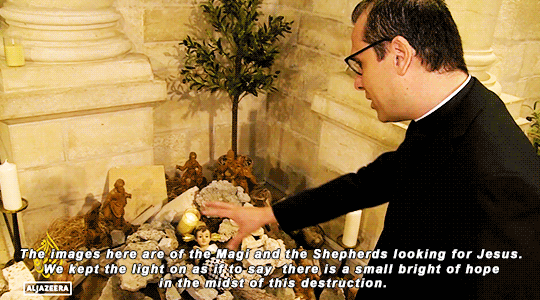
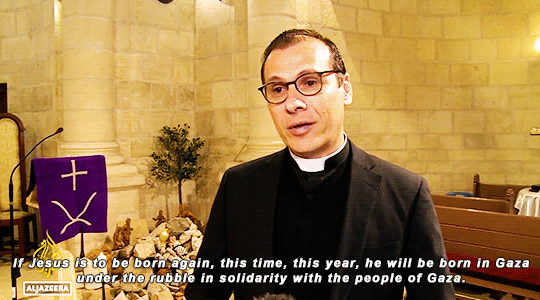
A Lutheran church in Bethlehem is displaying a sombre Christmas message, with a nativity scene that depicts an infant Jesus surrounded by rubble to reflect the devastation in Gaza.
Inside the West Bank church, a model of baby Jesus lies swaddled in a kaffiyeh, the distinctive patterned Palestinian scarf, as a light glows from amid the stones.
Rev Munther Isaac, pastor of the Evangelical Lutheran Christmas Church in Bethlehem, said that the image was intended to portray the suffering of families in Gaza.
“We came with the idea of a manger in the rubble and it’s inspired from the difficult images we see on a daily basis on our television screens of children being pulled from under the rubble in Gaza. These images break us and are devastating. We are tired of the world rationalising and justifying the killing of our children in Gaza.”
#friendly reminder that jesus was palestinian!#and also that it isnt a jew vs. muslim issue#palestinian christians are also targets#christmas#bethlehem#palestine#pro palestine#anti israel#anti zionism#mine*#gifs*
43 notes
·
View notes
Text
Christian Resources on Palestine
Since I am seeing a lack of resources for Christians concerning Palestine from a faith based perspective (aside from the usual Christian Zionist fervor), I tracked down some sources, religious and secular, to bridge that gap. Even if you're not Christian yourself and know some Christians who have questions about what's going on, please share this with them.
Christ at the Checkpoint - A ministry and conference from Bethlehem Bible College in Palestine.
Friends of Sabeel North America - A peacemaking, ecumenical Christian voice for Palestine.
Christian Zionism - A resource that critically analyzes the intentions and theology of Christian Zionists from a Christian perspective.
1948: Creation and Catastrophe (YouTube)- A documentary where Israelis & Palestinians who witnessed the Naqba in the late 1940s talk about their experiences as well as detailing the trail of the ordeal.
With God on Our Side (YouTube)- From Vision Video, a Christian video distributor, analyzing Christian Zionism and giving voice to the Palestinian perspective.
Peacemakers: Crossing the Divide - A film that features both Messianic Jewish and Palestinian Christian believers' peacemaking efforts in the Holy Land. You can watch it for free in various languages.
Musahala - Faith based organization focused on reconciliation between Jewish people & Palestinians regardless of ethnic or religious backgrounds.
Theology in the Raw Interviews:
Eli Bonila, Jr. - married to a Palestinian.
Dr. Gary Burge - questions Christian theological support for Israel
Alex Awad - Palestinian Christian
Daniel Banourra - Palestinian Christian
Lisa Loden - Israeli Jewish Christian (Messianic) featured in the Peacemaking: Crossing the Divide film.
Rabbi Hanan Schelsinger - formerly Zionist rabbi
Rev. Munther Isaac - the Lutheran pastor behind the Baby Jesus in the Rubble photograph from Bethlehem (also check out the first episode of OnScript where he's featured).
Hope these will serve as an aid to understanding this a bit more than some streams of theology would want us to think.
33 notes
·
View notes
Text
“I see God in the rubble,” said Munther Isaac, the Palestinian pastor of a landmark Lutheran church in Bethlehem, the West Bank town revered by Christians as Jesus’ birthplace. “And Christ was born under occupation.”
[...]
In Bethlehem, where many local Christians have relatives in Gaza, the Christmas holiday will be marked by prayers, church services and the annual procession of Christian patriarchs — but the more joyous traditional trappings are being eschewed. No twinkling Christmas lights, no lavishly decorated tree in Manger Square, no festive parade with marching bands.
“How could we celebrate?” asked the town’s mayor, Hanna Hanania, whose office overlooks a nearly deserted Manger Square. The flagstone plaza facing the Church of the Nativity, a pilgrimage site for Christians the world over, is usually bustling at this time of year, but most of the souvenir shops and restaurants lining it are tightly shuttered.
Bethlehem, where once-majority Christians now make up fewer than one-fifth of the town’s population of some 30,000, is a microcosm of the West Bank’s woes. Checkpoints hem it in, and the stony terraced hills — where shepherds watched their flocks by night, as the traditional Christmas carol has it — are transversed by a hulking Israeli security barrier.
Surrounded by Jewish settlements, the town is home to two Palestinian refugee camps that seethe with unrest and are regularly raided by Israeli troops.
“It’s not the little town of the Bible anymore,” said the Rev. Mitri Raheb, president of Bethlehem’s Dar al-Kalima University. At 61, he remembers when the unobstructed view from his nearby family home was a mountainside that turned green in spring rains. Now it is topped by a settlement, one of nearly 150 in the West Bank, which are considered illegal under international law.
For Palestinian Christians, the current war marks a catastrophe embedded within a catastrophe: the potential eradication of what was already a minuscule Christian presence in Gaza. Numbering fewer than 1,000 out of a population of more than 2 million, the community’s wartime losses are disproportionately felt.
Many Bethlehem-area Christians have relatives in Gaza, and are terrified for their safety.
195 notes
·
View notes
Text
A Christmas message from Rev. Munther Isaac
“If you are not appalled by what is happening in Gaza…there is something wrong with your humanity… we, the Palestinian people, will recover… but for those who are complicit, I feel sorry for you. Will you ever recover from this?”
12 notes
·
View notes